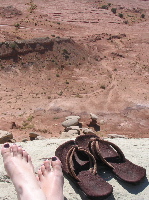People Study Astronomy; Hijinks Ensue
Typically, one would be afraid that a 244 page anything showing up on astro-ph would be dry and boring in addition to being long, especially if it lacks figures. The recent summary of Astrophysics in 2006, which showed up on astro-ph Monday evening, is in fact a 244 page report sans figures. But it's far from dry and boring—instead it's fresh and funny and snarky. I like snarky. And I know you blog-reading types are more likely to look for ways to punt on Fridays than other days of the week, so here you go. Think of it as a an astronomy blog carnival, only, papers instead of blogs.
The paper goes into all sorts of "real" astronomy, like "things of which there is currently only one (habitable planets, the Sun, and the universe)," but what I find the most entertaining are the sociological-esque aspects. This is especially true as the suspicion is that one motivation behind this treatise is providing an opportunity for the first author to rant. See for example,
the departures of Wesley Huntress, Eugene Levy, and Charles Kennel from the NASA Science Advisory Comittee. Their error seems to have been in advising that science continue to be done.
Or, in Section 4.2:
Each year, anything from 10 to 50 folks respond to requests for suggestions of highlights of the past year. The request is intepreted in interestingly different ways, ranging from “My gut feeling is that, for the first time in my career, the most exciting things may be in the fields of solar system studies and the discovery of planets rather than in my own realm of the extragalactic” to a list of 17 papers on arguments for the respondent’s own ideas, of which he is the senior or sole author. The “he” is deliberate. None of the responses of that sort were from women, though this may be a selection effect − 10% of 10% of 50 is 0.5 (and you must supply your own hermaphrodiate joke). This year the author who collects most of these responses thought it only fair to be sure that at least one paper or topic proposed by each respondent get mentioned. A good many of the suggestions already had green circles, red rectangles, or other notebook entries; some were out of period (perhaps in Ap07) or otherwise not in the data base.
Can you imagine having collaborators like this?:
We caught at least two papers being retracted out from under their first authors, who either disagreed or were not consulted (Nature 437, 940; Science 310, 49; Science 310, 425). One of the first authors concerned plans to sue.
Of course, to the outside world, the biggest happening in astronomy in 2006 was that whole Pluto and "definition" of a planet mess. So, of course, this is mentioned on at length, including some of the press reaction:
Concerning Kuiper Belt and Trans-Neptunian objects, there is both good news and bad news. The good news is that 2003 UB313, the one that caused all the fuss and bother about what is a planet is now merely Eris, named for the goddess of discord, and her moon is Dysnomia, goddess of lawlessness and daughter of Eris. Those are IAU committee decisions and so to be trusted as much as any IAU committee decisions. But the LA Times article reporting the names also declared that Clyde Tombaugh named Charon after his wife Charlene. Yes, Tombaugh (1906−1997) was very much alive when Charon was discovered in 1978 (by James W. Christy of the US Naval Observatory), but he was not the discoverer, and his wife was Patricia (nee Edson) 43. You might want to start over and assume that Christy’s wife’s name is Charlene and that the LA Times has (at least) one editor like the one who just processed a chapter of ours for a book on evolution in general.Given that I like the sociological aspect, the most entertaining (and potentially embarassing) section is the final one, "Misteaks Were Made." A few of these are clear honest errors (e.g., “four redshift bins over 0.1 Mpc < z < 3.0 Mpc"); others were just plain hilarious:
ISS is like an old suitcase whose handle is missing − it is totally useless, but you just can’t bear to part from it” (Nature 437, 1214).They also mention at least twice the acknowledgements including the "faint praise" of "EB thanks the Israeli Army for hospitality during the last month of this project.” And did I mention the snarkiness?:
“Does it really make a material difference whether references are arranged by authors (alphabetically) or numerically?” (Nature 437, 1232). Oh, only to the grammatical structure of about every third sentence.Mmm, snarky.


3 comments:
Thanks for the link. I'd have missed it.
How is it an error to say than on old suitcase with no handle is useless but impossible to get rid of? That sounds accurate to me. Or at least, for me.
I think the implication is that the ISS that is the error, not the statement.
Post a Comment